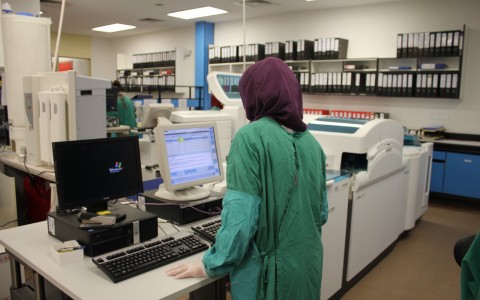Blood Chemistry 101 from a Functional Medicine Perspective
- Introduction to Blood Test Analysis
- Understanding Complete Blood Count (CBC)
- Insight into Complete Metabolic Panel (CMP)
- Studying Vitamin D
- Inflammation Markers - CRP
- Decoding Thyroid Markers
- Iron Markers
- Lipid Panel Assessment
- Micronutrient Markers: Folate, Vitamin B12
- Micronutrient Markers: Zinc, Copper, Magnesium
- Other Key Blood Chemistry Markers
- Implementing Lifestyle Recommendations for Improved Markers
- Pulling It All Together – Your Personal Health Assessment
Pulling It All Together – Your Personal Health Assessment
Case Studies: Applying Blood Test Knowledge in Real-Life Scenarios

Laboratory analysis performed on a blood sample.
In this part of the course, we will delve into several case studies that illustrate how the knowledge you've gained can be applied in real-life scenarios. Each case study will present a different set of blood test results, and you will be guided through the process of interpreting these results using the principles you've learned.
Case Study 1: High CRP and Low Vitamin D
Our first case study involves a patient with high C-reactive protein (CRP) levels and low Vitamin D levels. High CRP levels are an indication of inflammation in the body, which could be due to a variety of factors, including infection, injury, or chronic disease. Low Vitamin D levels, on the other hand, can lead to bone weakness and have been linked to depression and immune system issues.
In this scenario, a functional medicine approach might involve recommending lifestyle changes to reduce inflammation, such as a diet rich in anti-inflammatory foods and regular exercise. Additionally, the patient might be advised to increase their exposure to sunlight or take Vitamin D supplements to boost their Vitamin D levels.
Case Study 2: Abnormal Thyroid Markers
The second case study involves a patient with abnormal thyroid markers. The thyroid gland plays a crucial role in the body's metabolism, and abnormal thyroid markers can lead to a variety of health issues, including fatigue, weight gain or loss, and mood changes.
A functional medicine approach to this case might involve a comprehensive review of the patient's diet, exercise, and stress levels, as these factors can significantly impact thyroid function. The patient might be advised to incorporate more iodine-rich foods into their diet, engage in regular exercise, and practice stress management techniques.
Case Study 3: Elevated Iron Markers
Our final case study involves a patient with elevated iron markers. High iron levels can lead to a condition known as hemochromatosis, which can damage organs such as the heart and liver.
In this case, a functional medicine approach might involve recommending dietary changes to reduce iron intake, such as limiting the consumption of red meat and iron-fortified foods. The patient might also be advised to avoid alcohol and certain medications that can increase iron absorption.
In each of these case studies, the goal is not just to treat the symptoms, but to address the underlying causes of the abnormal blood markers. This is the essence of functional medicine - a holistic, patient-centered approach that empowers individuals to take an active role in their own health.